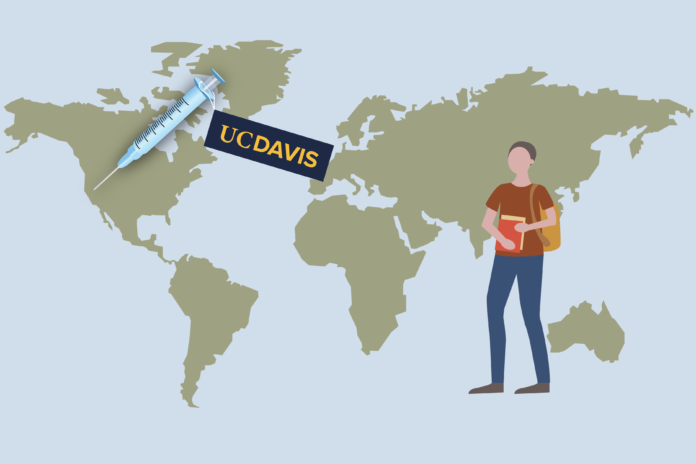Visas, time differences, travel restrictions and vaccine availability all create barriers for students living overseas who plan to return in the fall
International students discuss challenges with access to vaccines and difficulties getting back to campus or maintaining visa status for the upcoming in-person Fall Quarter.
Charlene Lujan Vega, a third-year doctoral student in anatomy, physiology and cell biology at the school of veterinary medicine, moved to Peru for what she thought would be a short-term field research project.
“I was going to come back in spring of last year, but then the pandemic—of course, I couldn’t come back,” Lujan Vega said.
Peru is listed as in a state of emergency related to COVID-19, but does not currently have a travel restriction.
As of today, the U.S. has a travel ban on several countries including India, China, Brazil and the U.K. as well as the European Schengen area.
Lujan Vega is acting as a caregiver for her two elderly parents in Peru, both of whom have now received their first round of vaccine, but Lujan Vega is still waiting.
“Here, I don’t think I will have any chance to get the vaccine because I’m 36,” Lujan Vega said.
Jinguang Chai is a second-year mathematics major and Chinese international student currently living in Davis. Both of Chai’s parents have received the vaccine, however they received a different vaccine than is available in the U.S. called CoronaVac.
Julia Ann Easley, a news and media relations specialist at UC Davis, said via email that the administration addressed the circumstances of international students in an announcement on the Fall Quarter campus plan on April 26.
“We recognize that some courses may need to modify their instruction modes to support students impacted by travel and visa restrictions and to accommodate specific faculty needs,” said Chancellor Gary May and Provost Mary Croughan in the announcement.
Wendon Song, a second-year computer science and philosophy double major, said his experience at UC Davis as an international student has been mixed.
“At the beginning of the [pandemic], a lot of people were anti-foreigner or anti-immigrant—it was kind of stressful,” Song said.
Anca Barcu, a first-year horticulture and agronomy graduate student, has been living in Romania since they started their courses at UC Davis.
“Given the 10-hour difference, it has been challenging because some seminars were as late as three in the morning,” Barcu said. “Although I’ve adjusted my sleep schedule that way, I’m not as productive as I would wish at three in the morning.”
Lujan Vega said she created a make-shift lab in her home with her parents. Her original plan to present at local universities was disrupted by the COVID-19 shutdown in Peru.
“Everything collapsed, and I said ‘Okay, I need to do something,’” Lujan Vega said. “I can work on my samples here, and I tried to create a small lab here with the resources that I had.”
Song said he has concerns about the ability to get back to China.
“I don’t know about the visa or I-20 document policy currently,” Song said.
Since specific restrictions vary, UC Davis Services for International Students and Scholars (SISS) provides resources on their website for international students.
Barcu said they are moving to the U.S. in two weeks, but difficulties with their partner getting a visa due to COVID-19 restrictions caused delays.
“I’m not traveling alone,” Barcu said. “For my partner, getting their visa has been very difficult because they weren’t processing that kind of visa at all. So that has been very challenging and very stressful.”
Chai said he does not have issues with his visa right now.
“But some of my friends, Chinese students who are living in China, may have difficulty flying back,” Chai said.
Barcu said their sister, who lived in the U.K., died of COVID-19 and that has impacted their studies.
“You get used to [the time difference], but losing my sister, not so much,” Barcu said.
For students who do not have access to the vaccine in their home countries, Chai suggests that incoming students should be given priority for vaccine appointments.
“For other countries, especially in India, I heard COVID-19 is bad,” Chai said. “So, especially for students in these places, the school should give them priority.”
May and Croughan said in their April 26 announcement that they are looking for ways to assist students in getting the vaccine who have been unable to get their vaccines prior to campus arrival, however the policy is not finalized. They also said there should be updated information provided in May.
Vikram Rao, the president of the Indian Graduate Student Association, said via email that he has been working with Wesley Young, the director of SISS to collect concerns from students in India.
Lujan Vega said that though she is still stuck in Peru, she is glad she was able to help her parents during the pandemic.
“I remember the last day before I took the flight, I was leaving the lab in Davis on my bike and I felt something strange, like a feeling saying ‘I will not come back,’” Lujan Vega said.
Written by: Kathleen Quinn — campus@theaggie.org




